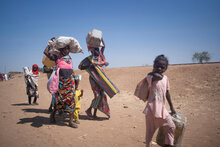WFP Boosts Assistance To South Sudanese, Both In Ethiopia And Across Border
“As we expand our capacity to airdrop more food into South Sudan, I take this opportunity to thank the Ethiopian authorities and our partners for their unwavering support to this giant logistical operation,” said WFP Country Director Abdou Dieng in Jimma. “Ethiopia is a vital corridor for food deliveries into South Sudan and this year over 500 flights have operated from Ethiopia, carrying essential food assistance to those desperately in need.”
WFP has delivered food into South Sudan through Ethiopia by air, road and river. Of the more than 123,000 metric tons of food that WFP has dispatched to locations in South Sudan since the beginning of the year, some 18,000 metric tons have travelled through Ethiopia so far, enough to feed more than 300,000 people for three months.
Fifteen WFP aircraft, based in Ethiopia, Uganda and inside South Sudan, transport food for the South Sudan humanitarian response. The Ethiopia-based aircraft include four airdrop-capable Ilyushin-76 airplanes based in Gambela and Jimma, while an additional two C-130 aircraft from Asosa support food deliveries by airlift – in which the plane lands to unload – for refugees in Maban County, South Sudan.
Within Ethiopia, WFP – working with UNHCR, the government refugee agency ARRA and NGO partners – also provides lifesaving food and nutrition assistance to more than 230,000 South Sudanese refugees, most of whom have arrived in the country since December.
The influx of South Sudanese fleeing conflict has raised the overall number of refugees in Ethiopia to more than 627,000, the largest refugee population in Africa. At border crossing points, WFP distributes calorie-packed High Energy Biscuits to give an immediate boost to the many South Sudanese who arrive exhausted and famished after walking for days to reach safety.
WFP and its partners are also distributing monthly rations of grains, pulses, vegetable oil, sugar and salt in refugee camps, and provide special nutritional supplements to treat more than 27,000 malnourished children, pregnant women and nursing mothers. Despite these efforts, malnutrition rates remain above emergency thresholds, with Moderate Acute Malnutrition (MAM) affecting more than one-quarter of children under the age of 5.
More funds are urgently needed to ensure WFP can continue and expand efforts to meet vital food and nutritional needs. WFP requires US$40 million to provide food and nutrition assistance through the end of the year to all refugees in Ethiopia, including newly arrived refugees from South Sudan.
“It is absolutely critical that we receive the resources needed to continue uninterrupted food assistance for the refugees, who have no other way to meet their daily food needs,” said Dieng. “We will do everything possible to avoid having to reduce food rations, but without new funding we will be running short of key commodities by the end of the year.”
# # #
WFP is the world's largest humanitarian agency fighting hunger worldwide, delivering food in emergencies and working with communities to build resilience. In 2013, WFP assisted more than 80 million people in 75 countries.
Follow us on Twitter @wfpethiopia and @wfp_africa
For more information please contact (email address: firstname.lastname@wfp.org):
Stephanie Savariaud, WFP/Ethiopia, cell. +251 911201976

